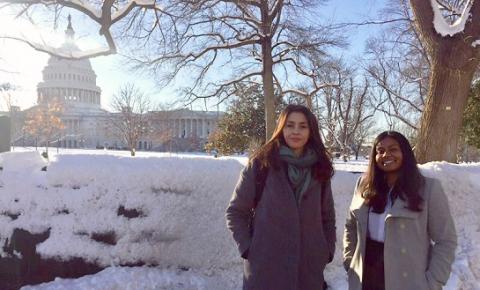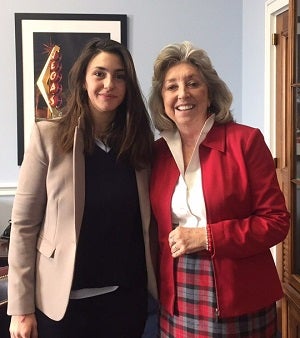Curbing Plastic Pollution: Environmental Law Clinic Pitches Proposals to Congress

With plastic waste becoming a global pollution crisis, faculty and students of UCLA School of Law’s Frank G. Wells Environmental Law Clinic traveled to Washington, D.C., in January 2019 to brief Congress on legislation that could help reduce plastic pollution in oceans. The trip capped a semester-long project led by UCLA Law’s Emmett Institute on Climate Change and the Environment and the Surfrider Foundation.
The UCLA Law contingent included students Charoula Melliou LL.M. ’19 and Divya Rao ’20, as well as Julia Stein, who is the clinic’s supervising attorney and the Emmett Institute’s project director.
Over two days, the group shared insights and policy recommendations with Reps. Alan Lowenthal (D-California), John Sarbanes (D-Maryland) and Dina Titus (D-Nevada), and with legislative staff members from several other offices. Their main message: Congress needs to look beyond recycling and develop legislation that attacks the problem at its source, by regulating single-use plastics at their point-of-contact with consumers.
Also joining the meetings were Susanne Brander, a toxicologist at Oregon State University; Angela Howe, legal director of Surfrider Foundation; and Jennie Romer, an attorney and expert on laws governing plastic bags.
Stein said that China’s decision last year to curb imports of recycling waste from the United States has focused legislators’ attention on new ways to manage plastic trash. “If someone else isn’t taking our waste, where does it go?” she asked. “What do we do with it?”
Ahead of the briefings, Melliou and Rao researched policies that cities, states and countries have enacted to manage plastic pollution. They compiled their research in a new report, “Federal Actions to Address Marine Plastic Pollution,” which details the scale of the plastic pollution problem, reviews existing domestic and international regulation, and outlines ideas for federal policy.
 Melliou meets with U.S. Rep. Dina Titus.
Melliou meets with U.S. Rep. Dina Titus.
For Rao, who is pursuing an MBA/J.D. joint degree at UCLA, and Melliou, an LL.M. student at UCLA Law and practicing attorney in Greece, the opportunity to perform the research and then present it along with legislative proposals to members of Congress was transformative.
“The experience with the Environmental Law Clinic has been one of the most significant in my academic and professional life,” Melliou said. “I have started to fulfill my dream of serving the environment as an advocate and litigator.”
To build a case for federal intervention, the students absorbed a wave of new science on the impacts of plastics in oceans. “In the past six months, a lot of information has come out that has changed the picture,” Rao said. New studies are shedding light on plastic’s presence in the food chain and potential impacts on human health. Research has also shown the limits of recycling processes in effectively managing the types and volumes of plastic material in the stream of commerce.
The authors recommend that Congress implement a ban on single-use plastic bags and a fee for all paper, compostable or other carryout bags. They also propose a ban on straws, polystyrene foam containers and other single-use plastics. “Similar policies have been implemented successfully in many cities, which see their waste management and clean-up costs diminish at astonishing rates,” Melliou said.
Congress has shown an interest in taking action. In 2015, it passed the Microbead-Free Waters Act with bipartisan support. Lawmakers are now looking to update the Save Our Seas Act, a 2018 law that focuses on international plastic pollution, so that it also addresses waste generated in the United States.
Howe orchestrates the Surfrider Foundation’s Rise Above Plastics program and provided guidance to Melliou and Rao ahead of the D.C. trip, meeting with them at UCLA and on the sidelines of the Environmental Law Conference at Yosemite.
She said that the students made an invaluable contribution: “The outstanding research, writing and presentations of the clinic helped to capture the attention of and cultivate champions in the federal legislature to reduce or prevent the tide of plastic pollution flowing to the world’s oceans.”
Every year, students in the Frank G. Wells Environmental Law Clinic work with environmental and community groups on regulatory and litigation matters. Recent clients include the Natural Resources Defense Council and Environmental Defense Fund. The clinical work provides students hands-on experience practicing environmental law and has helped dozens of students launch successful careers in environmental law and policy.